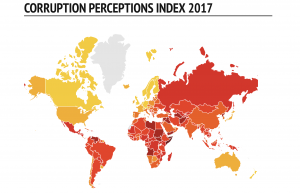Uruguay: the least corrupt country in Latin America

When we ask foreign buyers as to what attracted them to our country; we get a range of varied answers. However, a common key factor is that they carefully researched Latin American countries looking for the safest, least complicated and “freest” country in the region, and Uruguay always shows up among the top ranked democracies.
https://www.transparency.org/news/feature/corruption_perceptions_index_2017
Being considered the “least corrupt” or “more transparent” country in a continent is an achievement that Uruguay has been boasting for some time now, and once again, in 2017, Uruguay came at the top at the rankings. Its politicians and its people take this achievement seriously.
According to Transparency International, this year’s Corruption Perceptions Index highlights that the majority of countries are making little or no progress in ending corruption, while further analysis shows journalists and activists in corrupt countries risking their lives every day in an effort to speak out. The index, which ranks 180 countries and territories by their perceived levels of public sector corruption according to experts and businesspeople, uses a scale of 0 to 100, where 0 is highly corrupt and 100 is very clean. This year, the index found that more than two-thirds of countries score below 50, with an average score of 43. Unfortunately, compared to recent years, this poor performance is nothing new.
In the last few years, Latin America and the Carribbean made great strides in the fight against corruption. Laws and mechanisms exist to curb corruption, while legal investigations are advancing and citizen anti-corruption movements are growing in many countries across the region. However, according to www.transparency.org the region continues to score poorly for corruption.
Uruguay ranked # 1 in South America; #3 in the Americas after Canada and the U.S. and # 23 in the world.
Progress continues across the region with the investigations of several high profile cases of corruption. For example, the Odebrecht case resulted in sanctions for businessmen and political figures at the highest levels because of their involvement with bribery and illegal funding in exchange for public contracts.
While progress has been made to combat corruption in several countries, there are still no overarching policies in place to address the historic and structural causes of corruption throughout the region. Countries that prioritize anti-corruption and create national policy through consensus and public and political participation are better positioned to make a significant qualitative leap forward.


Dejar un comentario
¿Quieres unirte a la conversación?Siéntete libre de contribuir